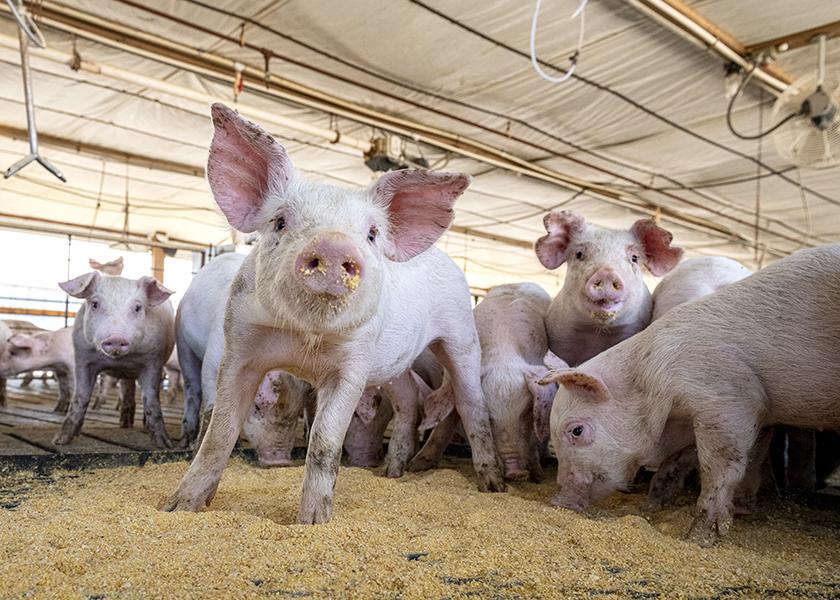Can Net Energy Diet Formulation Improve Sustainability in Pork Industry?

As the pork industry looks for opportunities to decrease its carbon footprint, could formulating diets based on net energy make a difference? Sustainability can be defined in so many ways or approached from so many different directions, says John Patience, professor of animal science at Iowa State University. But some experts say net energy formulation can provide a better path to sustainability.
Net energy will help to improve environmental sustainability, as it will tend to select diet formulations with lower crude protein and higher synthetic amino acid levels in the diet, Patience adds. The critical key to overall success here is to understand the maximum levels of synthetic amino acids that can be used in the diet, considering the age and health status of the pigs. At times like this, there is a very strong motivation to lower feed cost, but Patience reminds producers that the real objective is to maximize return over feed cost or return over feed cost per pig place in the barn. Formulating diets on a net energy basis can help use to achieve this, but it has to be done correctly, he adds.
“This will reduce the quantity of nitrogen that finds its way into the manure and this in turn reduces the quantity of nitrogen that needs to be applied to the land as fertilizer, which would translate into fewer acres needed to apply manure from a given size of barn,” Patience says.
Jim Hedges, a nutritionist at Ralco Feeds, also believes NE is a more sustainable path because when synthetics are used more consistently, you're feeding less protein to the pig which means less nitrogen excreted.
“Years ago when synthetics were not as reasonable in price and we didn't have as many synthetic amino acids as we have now, hogs were fed protein-formulated diets. You would feed a diet with a level of protein needed to reach the lysine required for optimum growth – the other amino acids in the diet were in excess of what the pig needed. This resulted in the amount of nitrogen in the manure being really high,” Hedges says.
Lately, he’s been hearing some growers complain that manure today isn’t what it used to be. And that is by design, Hedges says. As growers look to use more synthetics and less soybean meal, there can be a performance advantage and a cost savings. If you formulate on a net energy basis, you tend to use more synthetic amino acids. With NE formulation, his company has fed synthetic tryptophan routinely since 2012 and he says there has not been any time period it would not price in.
“We're in a business of growing hogs, not producing good manure,” Hedges says. “We don't make enough noise about the fact that we're pretty darn environmentally friendly.”
He also points out that Ralco Nutrition research shows that pigs drink less on a low-protein, high synthetic amino acid and enzyme diet.
“When we compared ME vs. NE diets, the hogs fed the NE diets from 50 lbs. to market consumed 77 lbs. of soybean meal vs the ME diet hogs which consumed 126 lbs. of SBM over this same period. The hogs fed the NE-formulated diets consumed 266 gallons of water versus 302 gallons for the ME-fed hogs,” Hedges says.
With excess nitrogen from the higher soybean meal diets, more water is required to keep the ammonia level below the toxic level in the body, he says, and of course this must be excreted.
“When I was in South America presenting that data, they were more excited about the water then the rest of the data. We're lucky in the U.S. that we have good water for the most part. When pigs drink less water, there is that much less waste into the pit so that much less to pump out,” Hedges says. “The beauty is that we can be environmentally friendly and lower ration cost if we use NE and incorporate amino acids and enzymes. It lowers the cost of the feed, therefore cost of production, and you're putting less nitrogen and minerals in the environment.”
However, when looked at from a different perspective, Patience says the net energy system will tend to discount the value of ingredients that are higher in fiber. Higher fiber ingredients are often derived from further processing of feed grains or plant protein sources. But the NE system will support more predictable performance of diets with higher fiber ingredients; this gives nutritionists more confidence in using these products. This, in turn, supports the economic viability of industries involved in further processing.
“Using these higher fiber ingredients or co-products helps sustainability, because it maximizes the nutritional value derived from the original grain or protein sources. Also, using higher fiber ingredients in pig diets will increase the fiber content of the manure, which in turn will increase the organic matter applied to the land when manure is used as a fertilizer,” Patience says.
“The energy system isn't going to get us there faster or better, but it’s going to help us make sure we are making the right decisions when we're choosing our ingredients,” says Chad Pilcher, a swine nutritionist with Provimi. “Net energy gives the pig something closer to its actual requirement. It may get you to carbon reduction faster or at least show you that it's more economical quicker.”
More from Farm Journal's PORK:
Is 2021 the Year to Take a Closer Look at Net Energy?
Don’t Pay For Energy Lost During Digestion, Swine Nutritionists Say
3 Ways to Lessen the Impact of High Feed Prices in Pork Production







